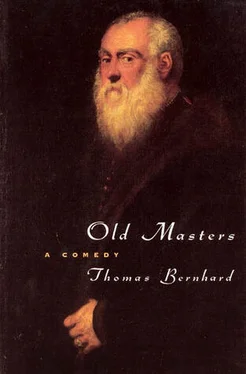with all that enormous knowledge which I conveyed to her, that she should have taken that enormous knowledge into death with her, that is the worst enormity, an enormity far worse than the fact that she is dead, he said. We force and we stuff everything within us into such a person, and then that person leaves us, dies on us, forever, he said. Added to it is
the suddenness of it, the fact that we did not foresee the death of that person, not for one moment did I foresee the death of my wife, I looked upon her just as if she had eternal life, never thought of her death, he said, just as if she really lived
with my knowledge right into infinity as an infinity, he said. Really a precipitate death, he said. We take such a person for eternity, that is the mistake. Had I known she was going to die on me I should have acted entirely differently, as it was I did not know she was going to die on me and before me and so I acted utterly senselessly, just as though she existed infinitely into infinity, whereas she was not made for infinity at all but for finiteness, like all of us. Only if we love a person with such unbridled love as I loved my wife do we in fact believe that person will live forever and into infinity. Never before, when sitting on the settee in that Bordone Room, had he kept his hat on, and just as the fact that he had ordered me to the museum for today disquieted me, because this was really the most unusual fact imaginable, as I thought, the fact that he had kept his hat on while sitting on the settee in the Bordone Room was most unusual, quite apart from a whole string of other unusual circumstances in this connection. Irrsigler had stepped into the Bordone Room and, having walked over to him, whispered something into Reger's ear, only to leave the Bordone Room immediately afterwards. Irrsigler's communication, however, at least viewed from the outside, produced no effect on Reger, after Irrsigler's communication Reger remained sitting on the settee just as before Irrsigler's communication. Nevertheless I was reflecting on what Irrsigler might have said to Reger. But I immediately gave up my reflections on what Irrsigler might have said to Reger and instead observed Reger and simultaneously heard him saying to me: People go to the Kunsthistorisches Museum because it is the done thing, they even travel to Vienna from Spain and Portugal and go to the Kunsthistorisches Museum so that back home in Spain and Portugal they can say that they have been to the Kunsthistorisches Museum in Vienna, which is surely ridiculous as the Kunsthistorisches Museum is not the Prado, nor the Lisbon Museum, the Kunsthistorisches Museum is a long way from being that. The Kunsthistorisches Museum does not even have a Goya and it does not even have an El Greco. I saw Reger and observed him and simultaneously heard what he had said to me the day before.
The Kunsthistorisches Museum does not even have a Goya, it does not even have an El Greco. Of course it can do without the El Greco, because El Greco is not a really great, not a first-class painter, Reger said, but not to have a Goya is downright fatal for a museum such as the Kunsthistorisches Museum. No Goya, he said, that is just like the Habsburgs who, as you know, had no understanding of art, an ear for music certainly, but no understanding of art. They listened to Beethoven but they did not see Goya. They did not want to have Goya. To Beethoven they accorded a fool's licence because music was not dangerous to them, but Goya was not allowed into Austria. Well, the Habsburgs have exactly this dubious Catholic taste which is at home in this museum. The Kunsthistorisches Museum is exactly that dubious Habsburg taste in art, aesthetic and repulsive. The way we talk to people who do not concern us in the least, he said, just because we need listeners. We need listeners and a mouthpiece, he said. All our lives we wish for an ideal mouthpiece and do not find it, for there is no ideal mouthpiece. We have an Irrsigler, he said, yet we are searching all the time for an ideal Irrsigler. We make a completely simple person our mouthpiece, and when we have made that completely simple person our mouthpiece we search for another mouthpiece, for another person suitable to be our mouthpiece, he said. After the death of my wife I have at least Irrsigler, he said. Irrsigler, like all Burgenlanders, was only a Burgenlandish dim-wit before he encountered me, Reger said. We need a dim-wit for a mouthpiece. A Burgenlandish dim-wit is an entirely suitable mouthpiece, Reger said. Don't misunderstand me, I esteem Irrsigler, I need him now like a piece of bread, I have needed him for decades, but only a dim-wit like Irrsigler is usable as a mouthpiece, Reger said yesterday. Of course we exploit such a dim-wit as a human being, he said, but on the other hand, by the very fact that we exploit him, we turn
such a dim-wit into a human being, by making him our mouthpiece and forcing our ideas into him, rather inconsiderately at first, granted, we make a Burgenlandish dim-wit, such as Irrsigler was, into a Burgenlandish human being. Before he encountered me, Irrsigler, for instance, had no notion of music, or of any of the arts, basically of nothing, not even of his dim-wittedness. Now Irrsigler is more advanced than any of those art-history twaddlers who come here day after day and assail people's ears with their art-history inanities. Irrsigler is more advanced than those art-history lecturing swine who every day with their twaddle ruin dozens of school classes, whom they drive before them, for life. The art historians are the real wreckers of art, Reger said. The art historians twaddle so long about art until they have killed it with their twaddle. Art is killed by the twaddle of the art historians. My God, I often think, sitting here on the settee while the art historians are driving their helpless flocks past me, what a pity about all these people who have all art driven out of them, driven out of them for good, by these very art historians. The art historians' trade is the vilest trade there is, and a twaddling art historian, but then there are only twaddling art historians, deserves to be chased out with a whip, chased out of the world of art, Reger said, all art historians deserve to be chased out of the world of art, because art historians are the real wreckers of art and we should not allow art to be wrecked by the art historians who are really art wreckers. Listening to an art historian we feel sick, he said, by listening to an art historian we see the art he is twaddling about being ruined, with the twaddle of the art historian art shrivels and is ruined. Thousands, indeed tens of thousands of art historians wreck art by their twaddle and ruin it, he said. The art historians are the real killers of art, if we listen to an art historian we participate in the wrecking of art, wherever an art historian appears art is wrecked, that is the truth. In all my life, therefore, I hardly ever hated anything with a fiercer hatred than art historians, Reger said. To listen to Irrsigler when he explains a painting to an innocent visitor is pure joy, Reger said, because in explaining a work of art he is never garrulous, he is not a twaddler, only a modest enlightener and reporter who leaves the work of art open to the beholder, who does not close it for him with his twaddling. That is what I taught him, Irrsigler, over the decades, how works of art should be explained as something to be contemplated. But of course anything Irrsigler says comes from me, Reger added, because naturally he has nothing of his own, but he has the best that there is in my head, even though learned second-hand, but useful now and again. The so-called fine arts are exceedingly useful to a musicologist like myself, Reger said, the more I concentrate on musicology and, actually, the more I have got stuck fast in musicology, the more intensively I concern myself with fine arts; conversely I think that is of the greatest advantage to, for instance, a painter if he devotes himself to music, in the sense that if he has decided on lifelong painting he should also pursue lifelong musical studies. The fine arts complement music in a wonderful way and the one is always beneficial to the other, he said. I could not imagine my musicological studies without a discussion with the so-called fine arts, especially with painting, he said. I handle my musical concerns so well because simultaneously, and with no less enthusiasm and no less intensity, I am concerned with painting. It is not for nothing that I have been going to the Kunsthistorisches Museum for over thirty years. Others go to a tavern in the morning and drink three or four glasses of beer, I sit down here and contemplate the Tintoretto. Crazy, perhaps, as you are bound to think, but I cannot do otherwise. For some it is their favourite lifelong habit to drink three or four glasses of beer at some mid-morning tavern, while I go to the Kunsthistorisches Museum. Some person may take a bath around eleven in the morning to help him clear his daily hurdle, while I go to the Kunsthistorisches Museum. If in addition we have a man like Irrsigler we have all we need, Reger said. Actually, I have never, ever since childhood, hated anything more than museums, he said, I am by nature a hater of museums, but it is probably just because of this that I have been coming here for over thirty years, I indulge in this doubtlessly mentally determined absurdity. As you know, I do not come to the Bordone Room for Bordone, indeed not even for Tintoretto, even though I consider the
Читать дальше












